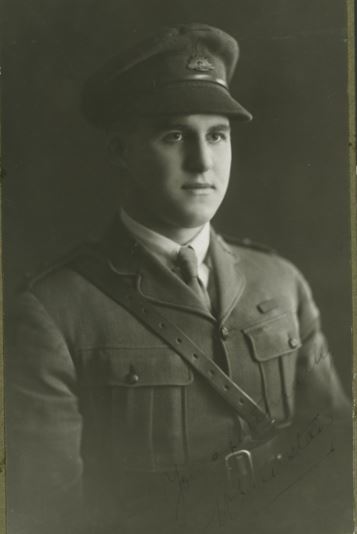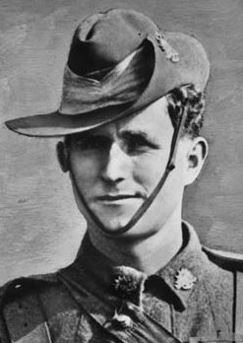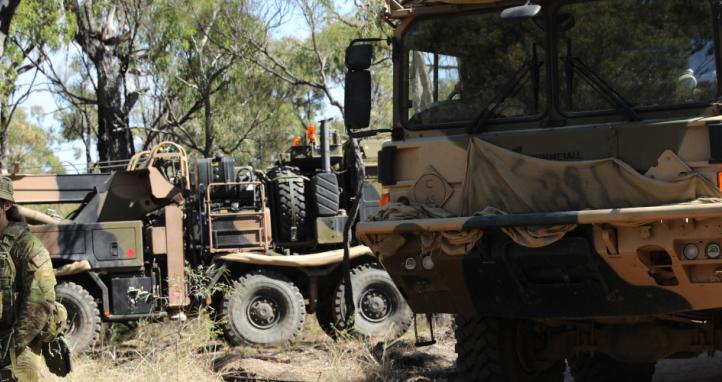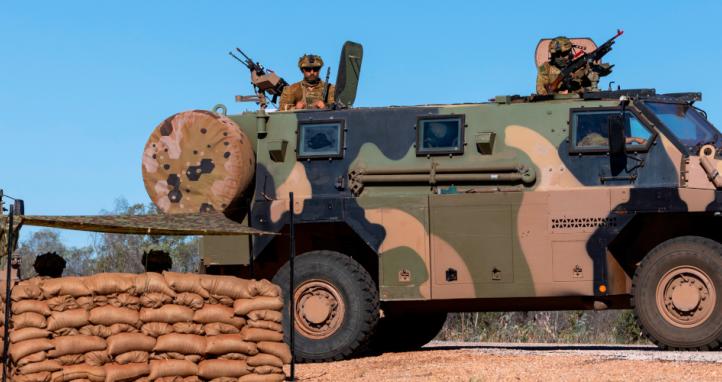Corporal William Dunstan VC (1895 - 1957, 61yo)
 Born on 8 March 1895 in Ballarat East, Victoria, William Dunstan left school in his mid-teens and took up work as a clerk. Alongside his civilian job, he actively participated in Australia’s compulsory cadet training scheme, rising to the rank of Captain. By July 1914, he had been commissioned as a militia officer in the 70th Infantry (Ballarat Regiment), reflecting both his discipline and leadership potential.
Born on 8 March 1895 in Ballarat East, Victoria, William Dunstan left school in his mid-teens and took up work as a clerk. Alongside his civilian job, he actively participated in Australia’s compulsory cadet training scheme, rising to the rank of Captain. By July 1914, he had been commissioned as a militia officer in the 70th Infantry (Ballarat Regiment), reflecting both his discipline and leadership potential.
Despite already holding a commission, Dunstan enlisted in the Australian Imperial Force on 2 June 1915 as a Private. Within a fortnight, he embarked for Egypt with the 6th Reinforcements to the 7th Battalion, temporarily promoted to acting Sergeant for the journey. His service would soon see him recognised in dispatches and catapulted into national prominence.
At Lone Pine on 9 August 1915, Dunstan was part of a small Australian force tasked with defending a newly seized trench against determined Turkish counter-attacks. As waves of enemy fire and bombs descended on their position, Dunstan, alongside Lieutenant Frederick Tubb, Corporal Alexander Burton, and six others, held their ground. When an explosion tore down their makeshift barricade, Dunstan and Burton immediately began rebuilding under intense pressure while Tubb returned fire. A bomb exploded between the two men, killing Burton and leaving Dunstan temporarily blinded—but their defence held. For his exceptional courage, Dunstan was awarded the Victoria Cross.
He received the medal from the Governor-General on 10 June 1916 in a public ceremony on the steps of Parliament House in Melbourne, an event that drew an outpouring of public admiration. A private man who shunned the spotlight, Dunstan reportedly found the attention overwhelming.
Dunstan passed away suddenly from coronary vascular disease on 2 March 1957. He was survived by his wife and children. Over 800 people, including seven fellow Victoria Cross recipients, attended his funeral at Christ Church in South Yarra. He was later cremated, remembered as a quiet figure who had displayed immense bravery in war.
Sergeant John Dwyer VC (1890 - 1962, 71yo)

John James "Jack" Dwyer was born on 9 March 1890 in the Tasmanian town of Port Cygnet. In the early years of adulthood, he travelled north to Queensland, where he worked in the cane fields and timber industry. By 1913, he had returned to Tasmania, contributing to the construction of the Lake Margaret Hydro-Electric Power Scheme.
Dwyer enlisted in the Australian Imperial Force on 4 February 1915 and joined the 15th Battalion at Gallipoli in August of that year. Following the evacuation of the peninsula in December, he was transferred to Egypt and reassigned to the 4th Machine-Gun Company. He later moved to the Western Front in June 1916.
His defining act of bravery occurred on 26 September 1917 near Zonnebeke, Belgium. During an assault, Dwyer was in charge of a Vickers machine-gun when a well-positioned German gun began causing heavy casualties. Acting decisively, he advanced with his Vickers under fire, eliminated the enemy crew at point-blank range, and brought their machine-gun back to his own position. Using both weapons, he played a critical role in repelling a counter-attack. He continued to fight with determination the following day, setting an example that inspired those around him. For his extraordinary gallantry, he was awarded the Victoria Cross.
Dwyer was commissioned in May 1918 and rose to the rank of Lieutenant by August. He returned to Australia in October and was formally discharged from the AIF on 15 December 1918.
Later in life, he suffered from dermatitis, which his family believed was linked to mustard gas exposure during the war. He passed away on 17 January 1962 on Bruny Island, survived by his wife, one son, and five daughters. Dwyer was honoured with a state funeral and buried with military distinction at Cornelian Bay Cemetery.
Last Reviewed 06/2025









